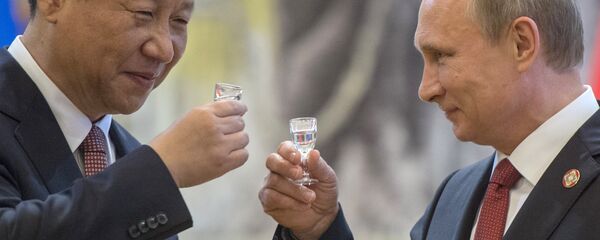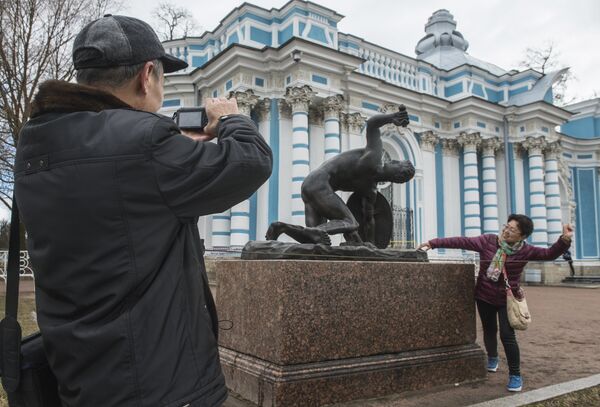MOSCOW (Sputnik), Tommy Yang — For Meng Aiju, a 55-year-old retiree from western China’s Gansu province, visiting Russia is like a childhood dream came true.
"Moscow Nights and Katyusha were my favorite songs growing up. I was always fascinated by the love stories in the songs and movies from the Soviet Union," Meng, who arrived in Moscow this week for a five-day tour in Russia, told Sputnik.
Limited Demographic Reach
Like Meng, most of her fellow travelers in the group of about 30 Chinese tourists are retirees in their 50s, who grew up immersed in Russian culture through music and movies from the Soviet era. The strong cultural connection between the China and the Soviet Union, dubbed as "Red Tourism," is being used as a main attraction in recent years for Chinese tourists who take their trip to Russia as a way to reminisce their younger years.
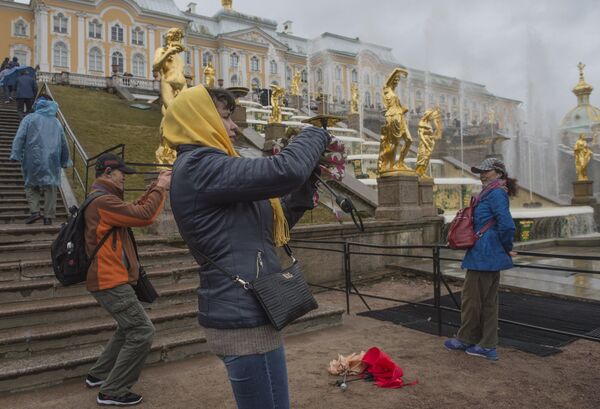
But there is one problem with this strategy. As a record number of Chinese tourists flocked to landmarks around the world in recent years, Russia is only taking a thin slice of this big pie, as the country is struggling to attract younger Chinese tourists who no longer have the same kind of cultural admiration of the Soviet era.
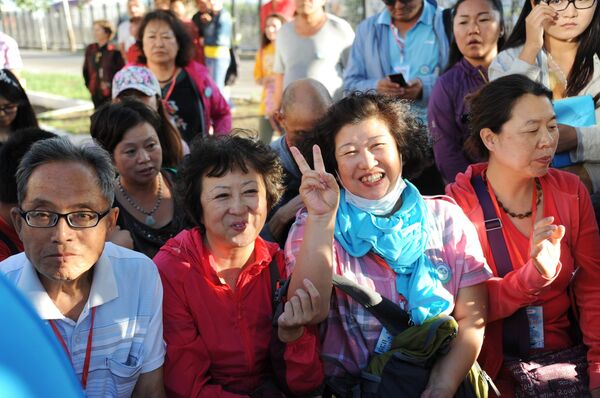
According to figures from the China Tourism Academy, the number of Chinese tourists traveling overseas reached a record of 122 million in 2016, while they spent a jaw-dropping $109.8 billion globally. In the meantime, official figures from Russia's state tourism agency Rosturism showed that the number of Chinese tourists who visited Russia in 2016 stood at 1.29 million, about 1 percent of China’s total outbound tourists of the year.
Among Meng’s group, Li Xiang, a 27-year-old civil servant from western China’s Xinjiang province, and his wife were the only ones in their 20s. The young couple got married on June 10 and decided to come to Russia for their honeymoon.
After considering destinations such as Japan and Thailand, the couple settled on visiting Russia because it’s only a 5-hour flight from Urumqi in Xinjiang province and they were able to obtain their arrival visa to Russia easily by traveling in a tour group.
Li told Sputnik that he was more attracted to the natural scenery of Russia than the cultural connection from the Soviet era.
"I don't know any of those USSR songs. I don't have any special feelings toward that era," he said.
Today, younger people like Li in China are no longer attached to modern Russian culture. Instead, they became loyal fans of artists and sports stars from the West. For example, retired NBA star Kobe Bryant has over 5 million followers on Chinese social media website Weibo.com. US pop singers such as Beyonce and Katy Perry have 2.3 million and 1.2 million followers, respectively, in China. In addition, cultural icons from Japan and South Korea also have a large number of Chinese fans.
"I’ve heard of young people who are loyal fans of Japanese or Korean cultures in China. But I’ve never heard of a group that are loyal fans of Russian culture," Sun Wei, a professor at the School of Economics of Peking University in Beijing, China, told Sputnik.
For instance, popular Russian artists such as Timati, Basta or Dima Bilan don’t even have a presence on Chinese social media. The most popular Russian artist on Weibo.com is Vitas, who is well known in China for his high-pitched voice. But he only has about 250,000 followers in China and is almost unknown to the Russian audience. When Russian singer Egor Kreed tried to use Chinese language on the cover of his new album called "What They Know," the Chinese words contained simple grammar mistakes.
According to Sun, Russia is known in China today as the "combative nation," which is famous for its strong spirit in fighting and winning wars. Sun suggested this image of Russia may not be so appealing to Chinese tourists.
"It’s up to the Russian authorities to spend more money to promote a different image and leave a better impression among Chinese tourists," Sun said.
Better Experiences in Russia
The young Chinese couple’s honeymoon in Russia had a rough start. After being bused around all day with a group of retirees, Li and his wife were fed with cheap food at designated restaurants run by Chinese tour operators. As part of the group tour, they did not have any freedom to choose where to eat or which places to visit.
When asked if he’s interested to return to Russia to explore more places with beautiful natural scenery, Li said he would like to try to rent a car and drive to different destinations in the country. But standing behind him, Li’s wife dropped a determined "no," adding that she couldn't stand the food she was offered in Russia.
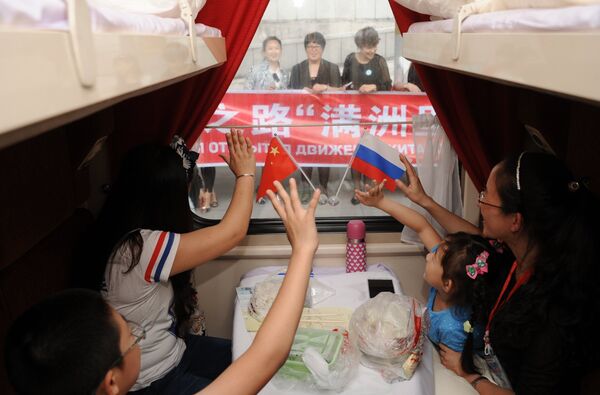
Li’s experience in the group tour is also a typical struggle many Chinese tourists have to go through when visiting Russia.
"Chinese tour operators in Russia are only interested in offering the lowest price, without trying to offer quality service," Polina Rysakova, deputy head of St. Petersburg Association of Chinese Speaking Guides, told Sputnik.
Rysakova, who has been working with Chinese tourists from mainland China, Taiwan and Hong Kong for almost 20 years, believes that the low prices Chinese tour operators offer gave them no reason to improve their services.
Meng’s group paid about $1,172 per person for a five-day tour covering both Moscow and St. Petersburg. The price includes roundtrip flights, accommodation and food, as well as train tickets from Moscow to St. Petersburg. Rysakova suggested such tour packages with good services would usually cost $3,000-4,000.
"Such low prices are barely enough to cover plane tickets and hotels," she said.
Rysakova added that tourists from Taiwan always preferred services from travel agencies operated by Russians because they can be sure about the accommodation and the overall experience they have, while Chinese tourists usually did not know what they signed up for until they arrived in Moscow. She estimates that about 80 percent of Chinese tourists traveling to Russia chose to go through Chinese tour operators.
Potential for Growth
Li also asked whether it’s possible to rent a car and drive in Russia with just a Chinese driver’s license. Despite Russia recognizing driver’s licenses issued by 82 countries that signed the 1968 UN “Vienna Convention on Road Traffic,” China is not one of the signatory countries. Therefore, holders of a Chinese driver’s license are not allowed to drive in the country. They will have to try to obtain a Russian driver’s license, which is a tedious process that requires taking driving lessons in Russia.
Rysakova suggested that, to make Russia more appealing to Chinese tourists and offer a better overall experience, Russian authorities may need to improve regulations and make them friendlier to foreigners.
"In general, regulations in Russia are not very friendly to foreigners. Even during the 2017 Confederation Cup, which is taking place in Russia right now, foreigners arriving in Russia have to complete their registration with Russian authorities within 24 hours," she said.
With international sports events such as the 2018 World Cup set to be held in Russia in the near future, Rysakova believes there is still a lot of work to be done to make Russian cities accessible for foreigners, including Chinese tourists.
"Until recently when they started to have signs in English, public transportation in Russian cities has been very difficult for foreigners to use," she said.
Both Rysakova and Sun, the professor at Peking university, agree that Russian authorities can put more efforts into promoting Russia’s soft power in China.
Sun noted that many countries, including the United States, European countries and Southeast Asian countries, have been putting a lot of efforts into hosting events in China and wooing Chinese tourists with detailed explanations and informative videos of the touristic attractions in their countries. But the efforts from Russia seem a bit lacking.
"There were simple grammar mistakes in Chinese language in one of the pamphlets I saw about tourism in Russia. And most of pamphlets were pictures without details about the destination," Sun said.
Sun, who received her PhD from Lomonosov Moscow State University, believes Russia has a lot more to offer to Chinese tourists than what is currently being promoted.
"I think places like Lake Baikal and Vladivostok can all be very interesting to Chinese tourists. Only issue is that many Chinese people have never heard of these places, because there was not enough detailed promotion," she said.
Sun added that Chinese tourists are still very price-conscious and it is up to Russia to prove why it is worth to spend their money visiting Russia, while for the same price they could visit a number of countries in Europe.


